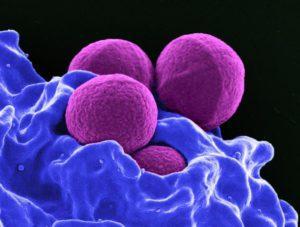Sensitisation is the first step in the immune response leading to allergy. House dust mites (HDM) possess allergens that are internalised and expressed by antigen presenting cells in the airways. The allergens then stimulate the production of plasma cells secreting IgE antibodies. These antibodies bind to mast cells through their Fc region, leaving their Fab region free to bind to the corresponding allergen at a later time. Production of allergen-specific IgE antibodies completes the process of allergen sensitisation.
IgE antibodies are reactive to a number of antigens produced by Staphylococcus aureus and Escherichia coli in people with atopic dermatitis (AD). These bacterial species have been found to be abundant in the microbiome of the HDM. HDM are common in many households and are usually difficult to remove completely. HDM allergy is very common and is associated with many allergic diseases. Therefore, investigators at the Medical University of Vienna, wanted to investigate if HDM have a role in IgE sensitisation in patients with AD.
As presented by Sheron Dzoro at the International Congress of Immunology (ICI) 2016, they analysed sera from 179 patients with AD for IgE reactivity to a panel of HDM allergens. They found that the frequency of IgE sensitisation was higher in participants with HDM allergy as opposed to participants without this allergy. Using antibody probes, they found that S.aureus and E.coli antigens were present in the HDM extracts as expected. When the researchers pre-incubated the sera from the patients allergic to HDMs with bacterial extracts, they found that IgE binding to the HDM extracts was inhibited in both a blotted HDM extract and in ImmunoCAP measurements.
In conclusion, this study reveals that HDM may carry bacteria that is responsible for inducing IgE sensitisation to certain antigens. Knowledge of what causes allergy may aid in the prevention and treatment of allergic reactions.
More information on the conference – International Congress of Immunology 2016
Article by Thandeka Moyo

